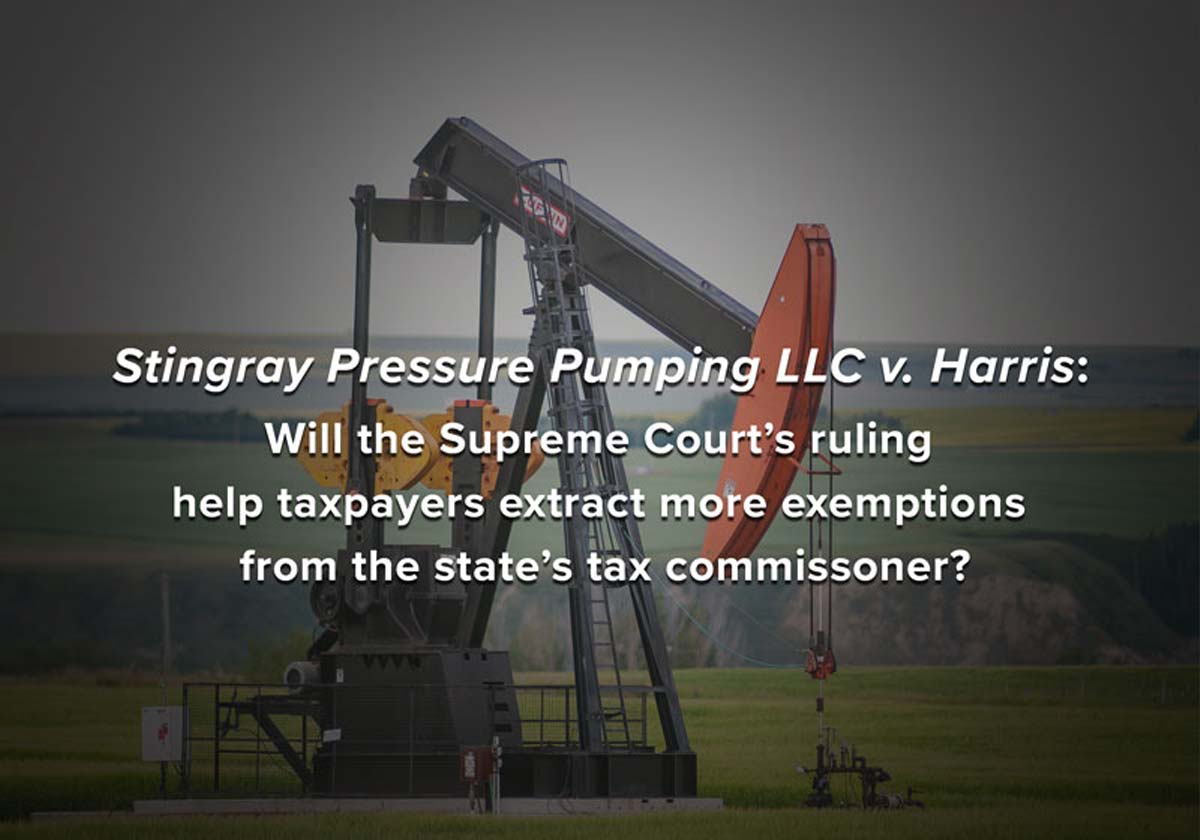On August 2, 2023, the Ohio Supreme Court rendered its decision in Stingray Pressure Pumping, L.L.C. v. Harris, 2023-Ohio-2598, a case that addressed whether certain equipment purchased in 2012 for use in “fracking” qualified for an exemption from Ohio sales and use tax. The exemption Stingray sought applies to “thing[s] transferred” that are “used or consumed directly in production of crude oil and natural gas for sale,” R.C. 5739.02(B)(42)(q).
Stingray has importance on two levels. On the first level, the decision provides some particularized guidance on how to apply the oil-and-gas production exemption, particularly the amended version, in the context of fracking equipment. In this buzz, we will not discuss the court’s substantive ruling concerning which items were held exempt and which were not.
On the second level, however, the Stingray decision has a far broader significance. The court majority repudiated the Board of Tax Appeals’ reliance on N.A.T. Transp., Inc. v. McClain, 165 Ohio St.3d 250, 2021-Ohio-1374, for the proposition that “because Stingray claims an exemption from the general operation of the sale tax, it must show that the amended statute ‘clearly expresses the exemption in relation to the facts of its claim.’” Stingray at ¶ 19. In discarding the long-applied rule of strict construction of tax exemptions, the court majority announced that “henceforth we will apply the same rules of construction to tax statutes that we apply to all other statues.” Stingray at ¶ 22. Under this new standard, the court will “provide a fair reading of what the legislature enacted.” Stingray at ¶ 22.
Should taxpayers view this as a significant change from prior law? The Supreme Court’s own public information office issued a press release under the headline “Tax Case Decision Has Broad Implications for Future Tax Cases,” and the article states that the court “would no longer construe tax statues against the taxpayer.” How broad are the implications? For taxpayers, we believe the implications are potentially very broad—and if the court adheres to the course it has laid out, Stingray could be very beneficial.
Before Stingray, Ohio Supreme Court cases called for applying the plain language of tax statutes, and when that language is unambiguous, no interpretative principles should be consulted. See Storer Communications v. Limbach, 37 Ohio St.3d 193, 194 (1988) (rejecting BTA’s decision to interpret a “clear, unambiguous statute that needed only application); Lancaster Colony Corp. v. Limbach, 37 Ohio St.3d 198, 199 (1988) (because “the first rule of statutory construction is to look at the statute’s language to determine its meaning,” no “interpretative effort” is required when “the statute conveys a clear meaning”).
On the other hand, under pre-Stingray law, if the court perceived ambiguity in a statute that provided an exemption from taxation, it applied the rule that the provision be strictly construed against the taxpayer claiming the exemption. See, e.g., National Tube v. Glander, 157 Ohio St. 407, 409 (1952); Celina Mutual Insurance Co. v. Bowers, 5 Ohio St. 2d 12, 15 (1965); E. Mfg. Corp. v. Testa, 154 Ohio St.3d 200, 2018-Ohio-2923, ¶ 22.
Because Stingray rejects the strict construction of tax exemption provisions, the opinion will fundamentally change the manner in which such provisions are interpreted; they will now be accorded a “fair reading” like any other statutory provision. This will remove one of the major legal hurdles that taxpayers had to overcome in seeking to claim an exemption from taxation.
From now on, Ohio taxpayers who advance exemption claims should demand a fair reading of the exemption statute, and they should cite Stingray as authority that the statute “must be read through a clear lens, not one favoring tax collection.” Stingray at ¶ 22.
ZHF Observation: The holding of Stingray naturally raises the question whether another precept formerly embraced by the Ohio Supreme Court remains good law in light of Stingray: “[I]t is a central tenet of tax jurisprudence that ‘a statute that imposes a tax requires strict construction against the state, with any doubt resolved in favor of the taxpayer.’” Saturday v. Cleveland Bd. Of Review, 142 Ohio St.3d 528, 2015-Ohio-1625, ¶ 21, citing Columbia Gas Transmission. Corp. v. Levin, 117 Ohio St.3d 122, 2008-Ohio-511, ¶ 34, 882 N.E.2d 400, citing Gulf Oil Corp. v. Kosydar, 44 Ohio St.2d 208 (1975), paragraph one of the syllabus. We believe that this central tenet of construing ambiguous tax laws in favor of the taxpayer will likely remain a part of tax law in Ohio.
Our reason for taking this view is the reliance of the Ohio Supreme Court majority in Stingray on the textualist treatise Scalia & Garner, Reading Law: The Interpretation of Legal Texts (2012). The court cited as part of its holding the section of that treatise rejecting the strict construction of tax exemptions: “ ‘Like any other government intrusion on property or freedom, a tax statute should be given its fair meaning, and this includes a fair interpretation of any exception it contains.‘ ” Stingray at ¶ 22, quoting Reading Law at 362. If the court adheres to the approach taken by the authors of Reading Law, it should follow the treatise’s apparent approval of the proposition that, in cases of doubt as to taxability, “a tax cannot be imposed without clear and express words for that purpose.” Id. at 359-360 (case citation omitted). Accord Clark Restaurant Co. v. Evatt, 146 Ohio St. 86, 91 (1945) (“in the construction and application of taxing statutes their provisions cannot be extended beyond the clear import of the language used; nor can their operation be so enlarged as to embrace subjects not specifically enumerated”). Taxpayers who want to rely on this precept should, however, show that a fair reading of the statute, applying the canons of interpretation approved in Reading Law, leaves a reasonable doubt as to whether the statute imposes the tax in relation to the facts of the case at hand.
If you would like to further discuss the contents of this post, please reach out to any of our ZHF professionals.


